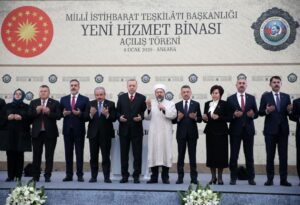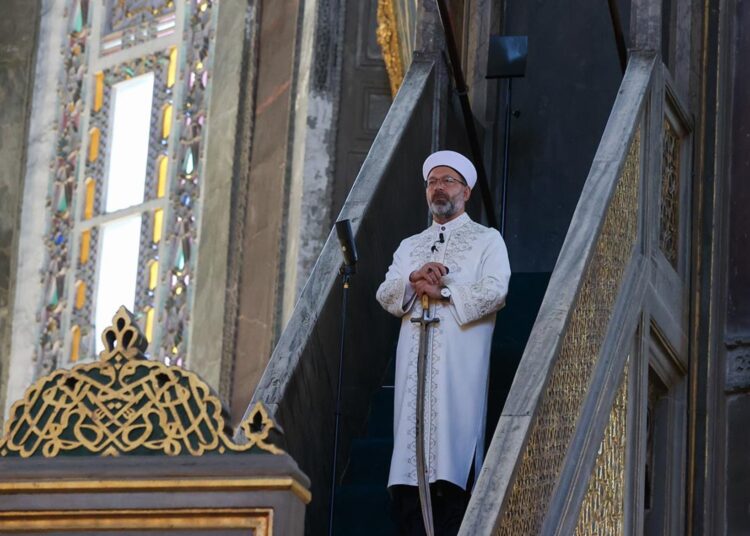Abdullah Bozkurt/Stockholm
The Islamist government of President Recep Tayyip Erdogan through its religious arm has set a target to reach nearly 12 million people abroad as part of influence operations, using mosques under Turkey’s control in Europe and North America to extend its ideological and political reach.
The goal was outlined in the Directorate of Religious Affairs’ (Diyanet) strategic plan for 2024 to 2028, which includes specific target limits, recommended tactics and proposed solutions to address identified shortcomings.
According to a copy of the plan obtained by Nordic Monitor, the Diyanet had reached 1.9 million people by the end of the previous strategic term (2020–2024) and aims to expand this figure to 11.9 million by the end of 2028.
The primary platform for these outreach activities is mosques, although special venues offering religious courses have also been used by the Turkish government. These platforms are operated by Turkish imams deployed overseas by the Diyanet and funded by taxpayer money.
The Diyanet’s foreign operations are overseen locally by religious attachés and counselors posted at Turkish embassies who enjoy diplomatic immunity while serving abroad. These officials report directly to the Directorate General of Foreign Affairs (Dış İlişkiler Genel Müdürlüğü), one of the Diyanet’s three main branches, operating under the direct supervision of the institution’s president.
The plan recommends salary increases for Diyanet personnel working on a contract basis, noting that the current compensation is insufficient to retain employees who are either nationals of host countries or hold permanent residency there. It states that an October 2022 pay raise was inadequate, leading to the resignation of over 100 staff members.
The plan urged the amendment of Law No. 633, which governs the Diyanet organization, to enable better compensation packages for contract employees.
The full text of the Diyanet’s strategic report outlines its objectives for the 2024 to 2028 period:
This year President Erdogan’s office directed the Diyanet to collaborate with nongovernmental organizations (NGOs) established by Turkey abroad as part of a comprehensive plan to strengthen their capacity. The aim is to use religious motivations to drive these NGOs toward advancing the political objectives of the Erdogan government in foreign countries.
The presidential office also requested that the Diyanet recruit more qualified personnel for Turkey’s foreign missions, enhance their administrative and technical capacities and allocate additional financial resources to organizations engaged in what it terms “cultural diplomacy.”
As of the beginning of this year, the Diyanet reported that it has 586 personnel serving abroad, including embassy counselors and attachés, with most employed on a contract basis. However, the foreign ministry’s 2024 internal report indicates a total of 1,497 personnel, including imams assigned to work at mosques and other religious institutions in the field.
The discrepancy in numbers arises from personnel assigned for temporary, short-term employment as well as a covert program operated by the Turkish intelligence agency (Milli İstihbarat Teşkilatı, MIT), which employs religious workers as a cover to deploy its agents in foreign countries.
Since Turkish imams can easily operate within immigrant communities and have direct access to local organizations and municipalities, this situation presents a prime opportunity for Turkish intelligence to not only gather information but also identify potential recruits within these communities.
The information gathered enables Turkish intelligence to identify vulnerabilities within local communities that can be exploited to influence national politics in favor of the Turkish government. Additionally, it establishes a network of connections that can be mobilized when necessary to launch protests and rallies in foreign countries.
The mandate of the Diyanet’s Directorate General of Foreign Affairs explicitly emphasizes the importance of coordinating its activities with other Turkish government agencies, including intelligence, in the selection, training and preparation of personnel assigned to serve abroad.
In an overarching and broad mandate, the circular defining the directorate’s mandate states that it “is required to fulfill any assignment given to it,” which may include espionage on foreign soil on behalf of Turkish intelligence.
Over the past decade the Erdogan government has significantly intensified its espionage operations abroad, with multiple government agencies actively recruiting agents, assets and informants, from dual citizens to foreign nationals, to gather intelligence and collect information.

The objective is to provide leverage for the Erdogan government in discussions with its counterparts, influence the policies of host governments, create proxies for mobilization to achieve political goals and suppress opposition groups within Turkish expatriate communities.
In recent years Turkish imams and mosques in Europe have come under investigation for espionage operations targeting critics and opponents of the Erdogan government. Many Western European countries, particularly Germany, France and Austria, have implemented measures to curb foreign interference from Turkey through the Diyanet and Turkish mosques.
To navigate obstacles in foreign countries, the strategic plan recommends that Turkey sign cooperation protocols with host nations to better protect imams from scrutiny. Proposed measures to address the challenges faced by Turkish imams include launching campaigns under the pretext of freedom of religion, collaborating with international human rights organizations to enlist allies and pursuing diplomatic efforts.
The plan also urges the recruitment of Turks who are already citizens of these countries and recommends their training in Turkey before they are assigned as imams. To support this initiative, the Diyanet has allocated 608 million Turkish lira for the program. Over a thousand students from Europe and North America have been educated and trained in Turkey, with many already assuming positions within the Diyanet.
The Diyanet possesses both the manpower and the financial resources to fulfill the ambitious agenda of the Erdogan government. As of this year, it has 140,185 personnel on its payroll, predominantly men, not including those hired in entry-level positions. The organization supervises approximately 90,000 mosques and has a budget for 2024 amounting to 91.8 billion Turkish lira, reflecting a staggering increase of 151 percent compared to the previous year’s budget of 36.5 billion lira.
The new budget proposal for 2025, submitted by the Erdogan government in September, has seen a further increase to 130.1 billion Turkish lira.












